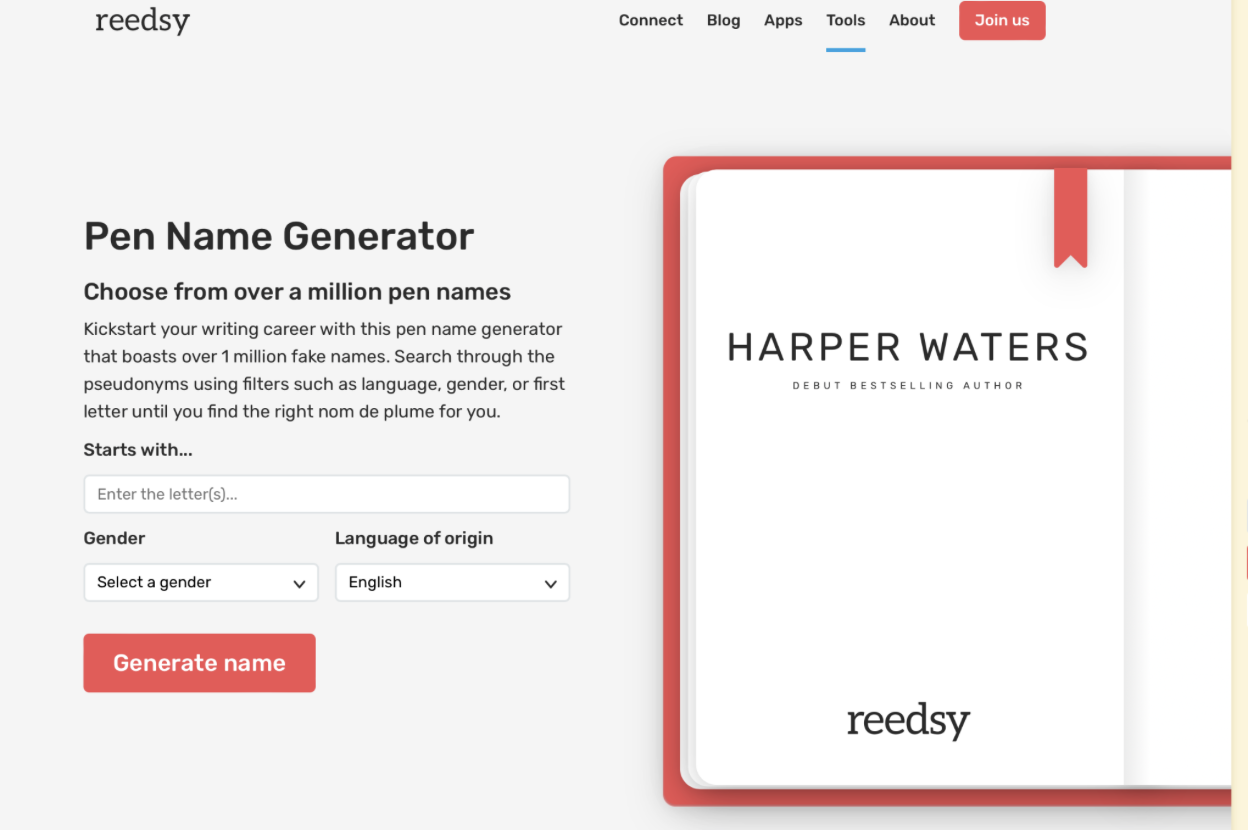Creating a Pen Name: Why Writing Under a Pen Name Works

Many authors choose to write under a pen name, seeking a level of anonymity or a fresh start. Using a pen name can be a liberating experience, as it allows writers to separate their literary identity from their personal lives.
An author's pen name can be a reflection of their personality, a nod to their heritage, or a clever play on words.
This article goes over pen names: what they are, why they work and how to generate pen name ideas.
Key takeaways:
- A pen name, or pseudonym, is an alias used by an author instead of their real name. It gives authors creative freedom to experiment or keep their public and private lives separate.
- To generate a pseudonym, authors can use tools like PublishDrive's Book Metadata Generator, Reedsy's Pen Name Generator, or create their own unique pen name by drawing inspiration from their interests, favorite authors, or wordplay.
- When creating a pen name, consider factors such as availability, genre harmony, target audience, personal connection, and branding potential. Once chosen, use your nom de plume consistently across all published works and secure a domain name to establish a strong online presence.
What Is a Pen Name?
A pen name, also called a pseudonym or nom de plume, is an alias an author uses instead of their real name. It's like a writer's incognito mode.
Why write under a pseudonym?
Readers often connect with the name on the cover, but for some authors, that name is a carefully crafted persona.
Pen names, or pseudonyms, offer writers a surprising amount of flexibility and control. Let's see the main motivations behind these literary aliases.
1. Explore options
Established authors utilize pen names to experiment with new genres or writing styles. This allows them to test the waters without potentially confusing their existing fanbase.
For instance, a writer known for chilling mysteries might explore heartwarming romances under a different name.
👉 Like Mary Westmacott, the nom de plume of Agatha Christie.
2. Make a fresh start
A book's reception can be unpredictable. A pen name offers a clean slate, allowing an author to present new work without the weight of past reviews or a previous genre association.
This can be particularly beneficial if a prior work hasn't garnered the desired response.
👉 Like Richard Bachman, the nom de plume of Stephen King. This pen name allowed Stephen King to publish several books a year when it was considered customary to publish no more than a book a year. Or Mark Twain, the pseudonym of Samuel Clemens.
3. Break barriers
Historically, women and certain demographics faced significant hurdles in the publishing world. Pen names acted as shields, allowing them to be judged based on the merit of their writing, not their identity.
Even today, some authors choose pen names to maintain privacy from their day jobs or avoid potential biases.
👉 Like Currer, Ellis, and Acton Bell, the nom de plume of Charlotte, Emily, and Anne Brontë or George Sand, pen name of Amantine Lucile Aurore Dupin.
4. Stand out
A common name can get lost in the sea of authors. A well-crafted pen name allows an author to establish a unique brand identity, making them more recognizable to potential readers.
👉 Like Lemony Snicket, the nom de plume of Daniel Handler, the author of the A Series of Unfortunate Events. Playfully twists the uptight persona of Jiminy Cricket, the conscience of Pinocchio.
Other times, pen names can also serve more personal purposes.
5. Maintain anonymity
Some authors write content that might not align with their professional image. A pen name creates a clear separation between their creative pursuits and their daily lives.
In our digital world, overzealous fans can also be cause for concern. Pen names offer authors a layer of anonymity, especially if they've faced harassment or threats in the past.
6. Genre distinction
An author who caters to multiple audiences might utilize pen names to differentiate their work. This can help readers easily identify the type of story they're picking up and works especially well for authors who write for young audiences but also delve into categories like erotica or horrors.
How to Generate a Pseudonym That Fits
Now that we understand why pseudonyms might be a good idea for authors, let’s see the easiest ways to get one.
1. Publishdrive Book Metadata Generator
Our newly launched Book Metadata Generator is an AI-powered Publishing Assistant that takes the burden of generating viable metadata from authors’ shoulders.
🔥 The Book Metadata Generator, part of PublishDrive’s Publishing Assistant, is a standalone service that authors can use even if they don’t choose to distribute with PublishDrive.
It has its own pricing structure and payment system. When starting out, users will get 60 free credits, which means they’ll be able to create metadata for one book.
It generates suggestions for all your book’s metadata, from title, subtitle, and series to pen names, Amazon categories, BISAC categories, and more.
Here is how it works
To use the Publishing Assistant, you need to sign up / sign into PublishDrive.
- You can find the option to access your Publishing Assistant when logging into PublishDrive, or you can head to Apps from your Distribution dashboard and then choose Publishing Assistant.
- Click to create a task and upload your manuscript (EPUB, DOCX, or PDF).
- Next, fill out your book’s info. When you’re ready, hit start, and you’ll see your new task added to the left-hand panel. It takes about five minutes for AI to analyze your book.
- Get recommendations for pen names, titles, blurbs, Amazon book categories, BISAC categories, keywords, and more.
🔥 Remember the suggested pen names are solely based on the uploaded file. You can use them for inspiration and edit the ones you like or add them to your list of potential pen names. You can generate more options that will always be tailored to the file in question.
2. Reedsy Pen Name Generator

Reedsy has developed a free pen name generator for authors that you can play with based on your genre’s specificities and fanbase expectations.
3. Write one yourself
If you don’t want to use a pseudonym generator, you can always write one yourself based on your own interests, favorite authors, or even a dash of wordplay.
Get creative and mine inspiration from anything that fuels your imagination. This could be anything from your favorite colors or childhood memories to the rhythm of your favorite song. It can even be as simple as using a combination of your initials and a strong adjective for a striking pen name.
What to Consider When Making a Pen Name?
A pen name can be a great way to establish a distinct identity for your writing. But before diving in, here are some things to consider:
- Availability & uniqueness: Check for existing authors, actors, or public figures with the same name. Avoid anything too close to established names.
- Genre harmony: Consider how the name fits your genre.
- Target audience: Think about your ideal reader's age and background.
- Personal connection: Sit with the name for a few days. Does it feel right? If it’s honoring someone, get their okay first.
- Branding potential: Consider how the name sounds and looks – is it catchy and easy to remember? Can you easily find a matching website and social media handles to build a strong online presence?
Remember, this name will represent you and your work, so ensure it resonates with your genre and feels like a natural fit for the audience you're trying to reach.
Using your pen name effectively
Once you've found the perfect pen name, here's how to use it:
- Claim your space: Search the U.S. Trademark Office to avoid conflicts and secure a domain name.
- Be consistent: Use your pen name on all your published works, including covers, copyright notices, and author bios.
- Publisher transparency: While you might want reader anonymity, your publisher will likely need to know your real identity. Depending on the level of anonymity you want, you can enclose an NDA for the publisher.
- Copyright protection: Register your work under your pen name, real name, or both to ensure copyright is protected.
Your Work Is Who You Are
Whether you choose to write under your own name or a carefully crafted pen name, remember that the power lies in the words.
Your name is the face on the cover, but it's the stories you tell that truly connect with readers. So pick a name you love, write passionately, and let your work be your legacy.
When it comes to publishing, we are here to help.
It’s free to publish your 1st ebook on PublishDrive. Or try out a paid plan and get your money back if you’re not satisfied.